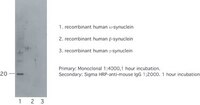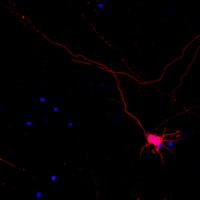Striatal oligodendrogliogenesis and neuroblast recruitment are increased in the R6/2 mouse model of Huntington's disease.
McCollum, MH; Leon, RT; Rush, DB; Guthrie, KM; Wei, J
Brain research
1518
91-103
2013
Show Abstract
The subventricular zone (SVZ) is one of the two major neurogenic regions in the adult mammalian brain. Its close proximity to the striatum suggests that a cell-based therapeutic strategy for the treatment of Huntington's disease (HD) is possible. To achieve this, it is important to understand how adult cell production, migration and differentiation may be altered in the HD brain. In this study, we quantified the number of adult-born striatal cells and characterized their fate in the R6/2 transgenic mouse model of HD. We found that the number of new striatal cells was approximately two-fold greater in R6/2 vs. wild type mice, while SVZ cell proliferation was not affected. Using cell-type specific markers, we demonstrated that the majority of new striatal cells were mature oligodendrocytes or oligodendroglial precursors that were intrinsic to the striatum. We also detected a significant increase in the number of migrating neuroblasts that appeared to be recruited from the SVZ to the striatum. However, these neuroblasts did not mature into neurons and most were lost between 1 and 2 weeks of cell age. Crossing the R6/2 mice with mice the over-expressing brain-derived neurotrophic factor in the striatum increased the numbers of neuroblasts that survived to 2 weeks, but did not promote their differentiation. Together, our data indicate that the potential treatment of HD based on manipulating endogenous progenitor cells should take into consideration the apparent enhancement in striatal oligodendrogliogenesis and the limited ability of recruited SVZ neuroblasts to survive long-term and differentiate in the diseased striatum. | 23623813
 |
Lithium protects against oxidative stress-mediated cell death in α-synuclein-overexpressing in vitro and in vivo models of Parkinson's disease.
Kim, YH; Rane, A; Lussier, S; Andersen, JK
Journal of neuroscience research
89
1666-75
2011
Show Abstract
Lithium has recently been suggested to have neuroprotective properties in relation to several neurodegenerative diseases. In this study, we examined the potential cytoprotective effect of lithium in preventing oxidative stress-induced protein accumulation and neuronal cell death in the presence of increased α-synuclein levels in vitro and in vivo. Specifically, lithium administration was found to protect against cell death in a hydrogen peroxide-treated, stable α-synuclein-enhanced green fluorescent protein (EGFP)-overexpressing dopaminergic N27 cell line. Lithium feeding (0.255% lithium chloride) of 9-month-old pan-neuronal α-synuclein transgenic mice over a 3-month period was also sufficient to prevent accumulation of oxidized/nitrated α-synuclein as a consequence of chronic paraquat/maneb administration in multiple brain regions, including the glomerular layer, mitral cells, and the granule cell layer of the olfactory bulb (OB), striatum, substantia nigra pars compacta (SNpc) and Purkinje cells of the cerebellum. Lithium not only prevented α-synuclein-mediated protein accumulation/aggregation in these brain regions but also protected neuronal cells including mitral cells and dopaminergic SNpc neurons against oxidative stress-induced neurodegeneration. These results suggest that lithium can prevent both α-synuclein accumulation and neurodegeneration in an animal model of PD, suggesting that this drug, already FDA-approved for use in bipolar disorder, may constitute a novel therapy for another human disease. | 21710541
 |
Characterization of prefibrillar Tau oligomers in vitro and in Alzheimer disease.
Kristina R Patterson,Christine Remmers,Yifan Fu,Sarah Brooker,Nicholas M Kanaan,Laurel Vana,Sarah Ward,Juan F Reyes,Keith Philibert,Marc J Glucksman,Lester I Binder
The Journal of biological chemistry
286
2011
Show Abstract
Neurofibrillary tangles, composed of insoluble aggregates of the microtubule-associated protein Tau, are a pathological hallmark of Alzheimer disease (AD) and other tauopathies. However, recent evidence indicates that neuronal dysfunction precedes the formation of these insoluble fibrillar deposits, suggesting that earlier prefibrillar Tau aggregates may be neurotoxic. To determine the composition of these aggregates, we have employed a photochemical cross-linking technique to examine intermolecular interactions of full-length Tau in vitro. Using this method, we demonstrate that dimerization is an early event in the Tau aggregation process and that these dimers self-associate to form larger oligomeric aggregates. Moreover, using these stabilized Tau aggregates as immunogens, we generated a monoclonal antibody that selectively recognizes Tau dimers and higher order oligomeric aggregates but shows little reactivity to Tau filaments in vitro. Immunostaining indicates that these dimers/oligomers are markedly elevated in AD, appearing in early pathological inclusions such as neuropil threads and pretangle neurons as well as colocalizing with other early markers of Tau pathogenesis. Taken as a whole, the work presented herein demonstrates the existence of alternative Tau aggregates that precede formation of fibrillar Tau pathologies and raises the possibility that these hierarchical oligomeric forms of Tau may contribute to neurodegeneration. | 21550980
 |


















